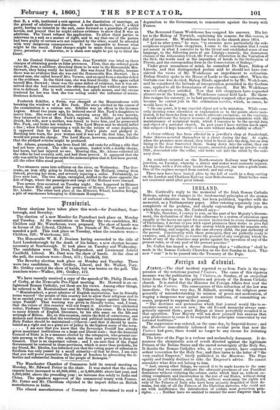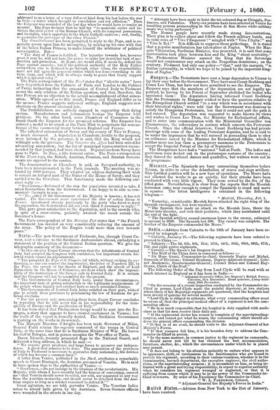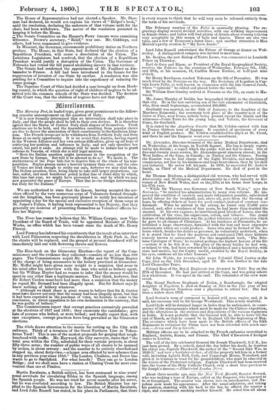furrigit nut Caltatial.
fraurt.—The chief incident reported to us from Paris is the sup- pression of the notorious journal r Univers. The cause of this rigorous measure was the publication by 1' Univers, on Sunday, of an encyclical letter from the Pope to the prelates and priests of the Roman Catholic church. It is stated that the Minister for Foreign Affairs first read the letter in the Univers. The consequence of this infraction of the law was immediate. On that very day, M. Billault, accusing the religious press generally of misunderstanding its mission of peace and moderation, of waging a dangerous war against ancient traditions, of committing ex- cesses, proposed to suppress the journal. " The doctrines and pretensions which that journal would like to re- suscitate among us are not new ; the old French monarchy always ener- getically opposed them ; great Bishops at times powerfully seconded it in that opposition. Your Majesty will not show yourself less anxious than your predecessors to cause to be respected the principles consecrated by our national traditions."
The suppression was ordered, on the same day, by Imperial decree ; and the ifoniteur immediately informed the secular press that now the Univers had gone, there would no longer be any excuse for irritating discussions.
The letter of the Pope is a verbose and melancholy document. It de- nounces the abominable acts of revolt directed against the legitimate Princes of the Italian States and the sacred sovereignty of the Holy Sae. It thanks the Roman Catholics who, in every quarter, have expreszed ardent veneration for the Holy See ; and then turns to the letter of "the very exalted Emperor," lately published in the Moniteur. The Pope openly and frankly declines to take the Emperor's advice. He cannot surrender what does not belong to him. "And among other things, we caused it to be made known to the same Emperor that we cannot abdicate the aforesaid provinces of our Pontifical dominions without violating the solemn oaths which bind us, without ex- citing complaints and insurrection in the real of our States, without doing an injury to all Catholic; and, finally, without weakening the rights not only of the Princes of Italy, who have been unjustly despoiled of their do- mains, but alsb of all the Princes of the Christian universe, who could not see with indifference the introduction of certain most pernicious
E
. . . Neither have we omitted to remind the same mperor that he
addressed to us a letter of a very different kind from his last before the war in Italy—a letter which brought us consolation and not affliction." Then the Emperor was reminded of the last day when he would have to render an account. The Pope declares that he will try "to maintain entire and in- violate the civil power of the Roman Church, with its temporal possessions, and its rights, which appertain to the whole Catholic universe ; and, finally, to guarantee the just cause of the other Princes."
The Constitutionnel has been permitted to reply to the Pope, and is es- pecially severe upon him for attempting, by mixing up his case with that of the fallen Italian Princes, to make himself the arbitrator of political sovereignties. But- " The duty of France is fulfilled. The injustice towards her, however great it may be, will not have the power to make her desert her task of mo- deration and protection. At Rome, she would still, if needs be, defend the Pope against anarchy ; but if the political authority of the Holy Father everywhere else is destined to go through other crises, the responsibility must not fall upon the generous nation which has done everything to ob- viate them, and which will be always ready to grant that trusty support .whish is ignored today." The Paris correspondent of the Nord states that " identic notes" have been despatched from the Cabinets of Paris and London to the Cabinet of Turin, intimating that the annexation of Central Italy to Piedmont seems the only solution of the Italian question, and that, therefore, the two Powers see no objection to the actual accomplishment of that annex- ation. While agreed as to this result, France and England differ as to the means ; France suggests universal suffrage, England suggests new elections on the present electoral law.
The Prohibitionists are actively engaged in supporting their dying system. Manufacturers and ironmasters besiege the Emperor with petitions. On the other hand, some Chambers of Commerce in the South thank the Emperor for the promised reforms. The Emperor has ordered a medal to be siruck at the Paris Mint to perpetuate the remem- brance of the commercial treaty between England and France.
The talked-of annexation of Savoy and the county of Nice to France, is much discussed. A deputation at Chambery, hostile to the proposal,
were informed by the governor, it is said, that the King would not
willingly cede the province. The Courrier des Apes had been seized for advocating annexation ; but the list of municipal representatives recom- mended by that journal, had been elected. Deputations from Savoy have gone to Paris. In Nice, a like ferment exists. The Paris correspondent of the Times says, the British, Austrian, Prussian, and Russian Govern- ments are opposed to the cession.
The demonstration at Chambery is said, on Savoyard authority, to have been misrepresented in the Paris journals. The meeting was at- tended by 3000 persons. They adopted an address declaring their wish to remain an integral part of the States of the House of Savoy, and they carried it to the Governor. That functionary made the following suc- cinct reply :— "Gentlemen,—Informed of the step the population intended to take, I asked Instructions from the Government. I am happy to be able to com- municate the reply to you :—
" The policy of the Government of his Majesty is known; it has not varied. The Government never entertained the idea of ceding Savoy to _France. Questioned already previously by the party who dared to moot the separation, the Government did not even think it necessary to reply.'"
This gave great satisfaction to the deputation, and to the crowds who, in spite of a snow-storm, patiently awaited the result outside the Governor's house.
The Paris correspondent of the Morning Post states that "the French Government has decided on very considerably reducing the amount of the army. The policy of the Empire tends more than ever towards peace."
taI11.—The new Government of Piedmont, has, through Count Ca- your, sent a circular to the Sardinian Ambassadors abroad, embodying a statement of the position of the Central Italian question. We give the telegraphic summary of the decument-
" In this circular Count Cavour observes that the inhabitants of Central Italy had accepted the Congress with confidence, but important events fol- lowed which caused its adjournment.
"The pamphlet Le Pape at is Congr'is (of which, without seeking its au- thorship, no one can contest the importance), tho letter of Napoleen III. to the Pope, the speech of the Queen of England, and the speech of Lord Palmerston in the House of Commons, are facts which show the impossi- bility of the restoration of the former rule in Central Italy. It is certain that the Congress will not be assembled for the present.
.
"The Governments of Central Italy have, under these circumstances, the important duty of giving satisfaction to the legitimate requirements of the people whose dignity and conduct have so much astonished Europe.
"The Governments of Central Italy being satisfied on their part, wished also to satisfy those provinces by proclaiming the law of Sardinia for po- litical elections.
"For the present only announcing these facts, Count Cavour concludes by repeating that he will never fail in his responsibility for the tran- quillity of Europe and the pacification of Italy."
It has been stated that Piedmontese troops would be sent into the Ro- magna, a story that appears to have created excitement in Vienna; but the truth of the report is formally denied. The Sardinian Government is pushing on the works in its arsenals.
The Marquis Massimo d'Azeglio has been made Governor of Milan. General Fanti retains the superior command of the troops in Central Italy, at the same time that he is Sardinian Minister of War. He leaves his staff at Bologna, and in person occupies the War-office at Turin. Baron Ricasoli, recently presented flags to the National Guard, and delivered a long address, in which he said :— " We require great prudence and large forces to preserve our indepen- dence. A great deal remains to be done. The annexation of the provinces of Italy to Piedmont is necessary to guarantee Italy nationality, the defence of which has become a common duty.'
A letter from Venice, published in the Nord, attributes a remarkable speech to Count Bissingen, the Austrian governor of Venetia. ibis said to have spoken thus to the authorities of Venice :—
"Gentlemen,—Do not indulge in the illusions of the revolutionists. His Majesty, with whom I have recently had the honour of conversing, assured me that Venetia should never be ceded, nor sold, nor separated in any way from the Austrian monarchy, and should never be detached from the Aus- trian empire so long as a musket remained to defend it.' "
Great agitation, we are told, pervades Venice. The Venetian ladies refuse to attend- balls given by the Austrians. Seven German officers were wounded in the streets in one day.
" Attempts have been made to hoist the tri-coloured flag at Chioggia, Por- tosecco, and Palestrina. Thirty-aix persons have been arrested at Venice for i insulting persons promenading n the Piazza di San Marco while military music was being performed." The Roman people have recently made strong demonstrations. Their plan is to collect about and follow the French military bands, and to raise cries of "Vive l'Empereur !" mingled with " Vive Phalle!" and "'Five le Rol !" It is difficult to suppress these gatherings. It is stated that a popular manifestation has taken place at Naples. When the Mar- quis Villamarina, Sardinian Minister, was presented, it is said that some conversation took place between him and the King "about neutrality." The Piedmontese Minister assured the King that his Sovereign would not countenance any attack on the Neapolitan dominions ; on the contrary, Piedmont had only one policy—" that," said the marquis, "is Italian nationality, in which we hope to be joined by the important king- dom of Naples."
Bangor !I.—The Protestants have sent a large deputation to Vienna to
lay their case before the Government. They have seen Count Rechberg and Count Leo Thun but have not been permitted to see the Emperor. The Emperor says that the members of the deputation are not legally, ap- pointed, he having by his Patent of September abolished the bodies who appointed them ! The deputation having informed Count Reehberg that the Protestants in Hungary wished to have the question relative to the Evangelical Church settled in a way which was in accordance with their historical rights," were told that the Government was desirous to satisfy the Hungarian Protestants, but that it could not quit the path it had entered. The deputation was requested to make known its views and wishes to Count Leo Thun, the Minister for Ecclesiastical Affairs, and to enter into communication with the Ministerial Councillor von Zimmernunan, the referendary in matters which concern the Protestant Church. Since the official interview, Count Rechberg has had private meetings with some of the leading Protestant deputies, and he is said to be under the impression that he will succeed in persuading them to obey an ordinance issued by the Minister for Ecclesiastical Affairs, which is neither more nor less than a peremptory summons to the Protestants to accept the Imperial Patent of the 1st of September. The Hungarians have had a "national" ball at Pesth. The ladies and gentlemen were decked out in the picturesque costume of the country ; they danced the national dances and quadrilles, but waltzes were not in the programme.
Enrurni.—The Spaniards are busy entrenching themselves before Tetuan, in order to cover the debarkation of stores and siege artillery. This fortified position will be a new base of operations. The Moors have not allowed the works to go on quietly, but their attacks have been conducted with very little vigour. They seem cowed by the fire of the rifled guns. Nevertheless, it is clear from the reports that the Moorish horsemen came near enough to compel the Spaniards to stand and move in squares. The latest intelligence is contained in the following telegram-
" Madrid, Thursday, Feb. 1. "Yesterday, considerable Moorish forces attacked the right wing of the Spanish encampment, but were repulsed. The Spanish then made an attack on the Moorish lines threw the Moors into disorder, and took their positions, which they maintained until the end of the fight. "The Spanish artillery caused enormous losses to the enemy, estimated to amount to 2000. The Spanish lost 200. The victory was complete. The brother of the Emperor commanded the Moors."
Saki 8.—Advices from Calcutta to the 18th of January have been re- ceived by telegraph :—
" Calcutta, jantsary 10.—The following regiments have been ordered to proceed to China :—
"Infantry.—The 3d, 6th, 8th, 31st, b7th, 44th, 56th, 60th, 66th, 67th, 73d, and eight native regiments. "Cavalry.—The Queen's 1st Dragoon Guards. "The Staff of the China force is composed as follows :—
"Sir Hope Grant, Commander-in-chief; Generals Napier and Michel, Generals of Divisions ; Colonel Stephens, Deputy-Adjutant-General. Colo- nel Mackenzie, Quartermaster-General ; Colonel Bruce and Colonel Hay- thorne, Chiefs of the Staff." The following Order of the Day from Lord Clyde will be read with as much interest in England as it has been in India :— " Adjutant-General's Office, her Majesty's British Forces, Calcutta, 21st December. Bead quarters, Camp Said- shad, 10th December. "On the occasion of a recent inspection conducted by the Commander-in- Chief in person, Lord Clyde made the painful discovery, at. two stations where three of her Majestyjs regiments are quartered, that the hospitals had been devoid of quinine for several months.
"Lord Clyde is obliged to reiterate, what every commanding officer must be aware of, that the principal medical officer of a regiment is not the com- manding officer. "Me is as much responsible that his hospital is duly supplied with medi- cines as that his men receive their daily pay. "If the regimental doctor has reason to complain of the superintending- surgeon, and cannot get what he wants, the commanding officer should ad- dress the general officer commanding the division. "If that is of no avail, he should write to the Adjutant-General of her Majesty's Forces. "If that resource fail him, it is his bounden duty to address the Com- mander-in-Chief in person. "In the same manner, in common justice to the regiment he commands, he should never rest till he has obtained the best accommodation, furniture, shelter, &c., which the circumstances under which he is placed may permit.
"It does not belong to his situation patiently to endure what appears to be ignorance, sloth, or carelessness in the functionaries who are lbound to provide his regiment, according to their various vocations, whether it be the commissariat, barrack department, the executive engineer, the civil autho- rities or the superintending surgeon ; it is incumbent on him, as being in- trusted with a great and trying responsibility, to report to superior authority when he considers his regiment wronged or neglected, or that it IS suffering from causes which it may be in the power of the Commander-in- Chief to remove. By order of his Excellency the Commander-in-Chief. "W. L. PABENHAM, Colonel, "Adjutant-General her Majesty's Forces in India." Unita Sillitlf.---Advices from New York to the 21et of Jinuary, have been received.
. The House of Representatives had not elected a Speaker. Mr. Sher- man had declared, he would not explain his views of Helper's book," until the resolution, declaring the endorsers of that volume unfit for the chair, had been withdrawn. The mover of the resolution persisted in keeping it before the House.
L,-.The Senate Committee on the Harper's Ferry emeute were examining witnesses. Brown's secretary, Realf," was one. Mr. Giddings, and others, had been summoned to give evidence.
In Missouri, the Governor, recommends prohibitory duties on Northern produce. The House, in that State, had declared that the election of a Republican President, will cause a dissolution of the Union. The Louisiana Legislature had resolved, that the election of a Republican President would justify a disruption of the Union. The Governor of Nebraska had vetoed the bill passed abolishing slavery in that territory. The Senate had confirmed the appointment of Mr. Faulkner as Am- bassador to France. A bill had been introduced in the Senate for the suppression of invasion of one State by another. A resolution was also pending fore Committee to inquire into the expediency of reducing the ocean postage.
The Supreme Court of Ohio had decided a case brought up from Hock- ing county, in which the question of right of children of negroes to be ad- mitted into the common schools of the State was decided. The decision of the Court was, that the children of negroes have not that right.




























 Previous page
Previous page